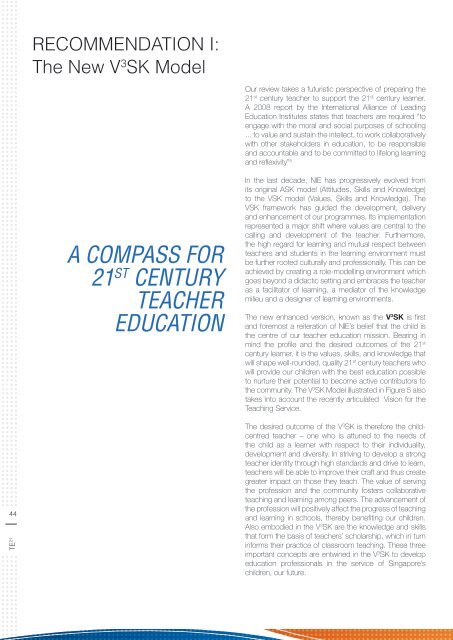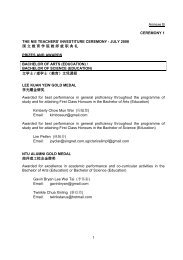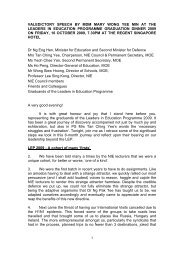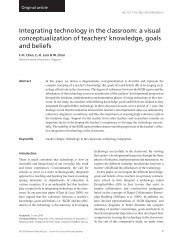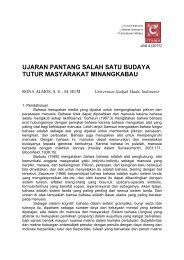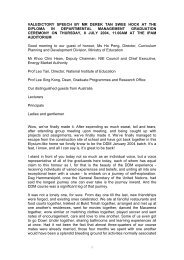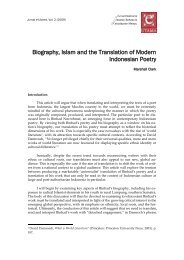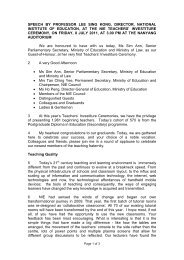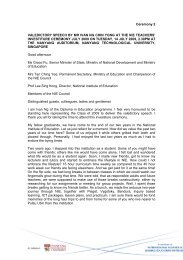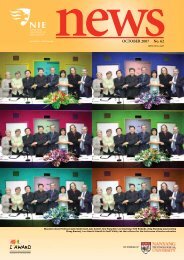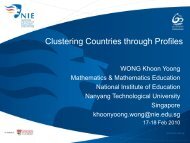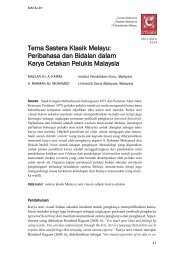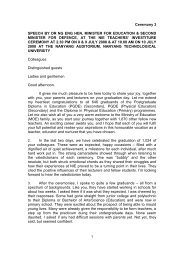A Teacher Education Model for the 21 Century - National Institute of ...
A Teacher Education Model for the 21 Century - National Institute of ...
A Teacher Education Model for the 21 Century - National Institute of ...
You also want an ePaper? Increase the reach of your titles
YUMPU automatically turns print PDFs into web optimized ePapers that Google loves.
44<br />
44<br />
44<br />
TE <strong>21</strong><br />
RECOMMENDATION I:<br />
The New V 3 SK <strong>Model</strong><br />
A compAss <strong>for</strong><br />
<strong>21</strong> st century<br />
teAcher<br />
educAtion<br />
Our review takes a futuristic perspective <strong>of</strong> preparing <strong>the</strong><br />
<strong>21</strong> st century teacher to support <strong>the</strong> <strong>21</strong> st century learner.<br />
A 2008 report by <strong>the</strong> International Alliance <strong>of</strong> Leading<br />
<strong>Education</strong> <strong>Institute</strong>s states that teachers are required “to<br />
engage with <strong>the</strong> moral and social purposes <strong>of</strong> schooling<br />
... to value and sustain <strong>the</strong> intellect, to work collaboratively<br />
with o<strong>the</strong>r stakeholders in education, to be responsible<br />
and accountable and to be committed to lifelong learning<br />
and reflexivity” 5<br />
In <strong>the</strong> last decade, NIE has progressively evolved from<br />
its original ASK model (Attitudes, Skills and Knowledge)<br />
to <strong>the</strong> VSK model (Values, Skills and Knowledge). The<br />
VSK framework has guided <strong>the</strong> development, delivery<br />
and enhancement <strong>of</strong> our programmes. Its implementation<br />
represented a major shift where values are central to <strong>the</strong><br />
calling and development <strong>of</strong> <strong>the</strong> teacher. Fur<strong>the</strong>rmore,<br />
<strong>the</strong> high regard <strong>for</strong> learning and mutual respect between<br />
teachers and students in <strong>the</strong> learning environment must<br />
be fur<strong>the</strong>r rooted culturally and pr<strong>of</strong>essionally. This can be<br />
achieved by creating a role-modelling environment which<br />
goes beyond a didactic setting and embraces <strong>the</strong> teacher<br />
as a facilitator <strong>of</strong> learning, a mediator <strong>of</strong> <strong>the</strong> knowledge<br />
milieu and a designer <strong>of</strong> learning environments.<br />
The new enhanced version, known as <strong>the</strong> V 3 SK is first<br />
and <strong>for</strong>emost a reiteration <strong>of</strong> NIE’s belief that <strong>the</strong> child is<br />
<strong>the</strong> centre <strong>of</strong> our teacher education mission. Bearing in<br />
mind <strong>the</strong> pr<strong>of</strong>ile and <strong>the</strong> desired outcomes <strong>of</strong> <strong>the</strong> <strong>21</strong> st<br />
century learner, it is <strong>the</strong> values, skills, and knowledge that<br />
will shape well-rounded, quality <strong>21</strong> st century teachers who<br />
will provide our children with <strong>the</strong> best education possible<br />
to nurture <strong>the</strong>ir potential to become active contributors to<br />
<strong>the</strong> community. The V 3 SK <strong>Model</strong> illustrated in Figure 5 also<br />
takes into account <strong>the</strong> recently articulated Vision <strong>for</strong> <strong>the</strong><br />
Teaching Service.<br />
The desired outcome <strong>of</strong> <strong>the</strong> V 3 SK is <strong>the</strong>re<strong>for</strong>e <strong>the</strong> childcentred<br />
teacher – one who is attuned to <strong>the</strong> needs <strong>of</strong><br />
<strong>the</strong> child as a learner with respect to <strong>the</strong>ir individuality,<br />
development and diversity. In striving to develop a strong<br />
teacher identity through high standards and drive to learn,<br />
teachers will be able to improve <strong>the</strong>ir craft and thus create<br />
greater impact on those <strong>the</strong>y teach. The value <strong>of</strong> serving<br />
<strong>the</strong> pr<strong>of</strong>ession and <strong>the</strong> community fosters collaborative<br />
teaching and learning among peers. The advancement <strong>of</strong><br />
<strong>the</strong> pr<strong>of</strong>ession will positively affect <strong>the</strong> progress <strong>of</strong> teaching<br />
and learning in schools, <strong>the</strong>reby benefiting our children.<br />
Also embodied in <strong>the</strong> V 3 SK are <strong>the</strong> knowledge and skills<br />
that <strong>for</strong>m <strong>the</strong> basis <strong>of</strong> teachers’ scholarship, which in turn<br />
in<strong>for</strong>ms <strong>the</strong>ir practice <strong>of</strong> classroom teaching. These three<br />
important concepts are entwined in <strong>the</strong> V 3 SK to develop<br />
education pr<strong>of</strong>essionals in <strong>the</strong> service <strong>of</strong> Singapore’s<br />
children, our future.


